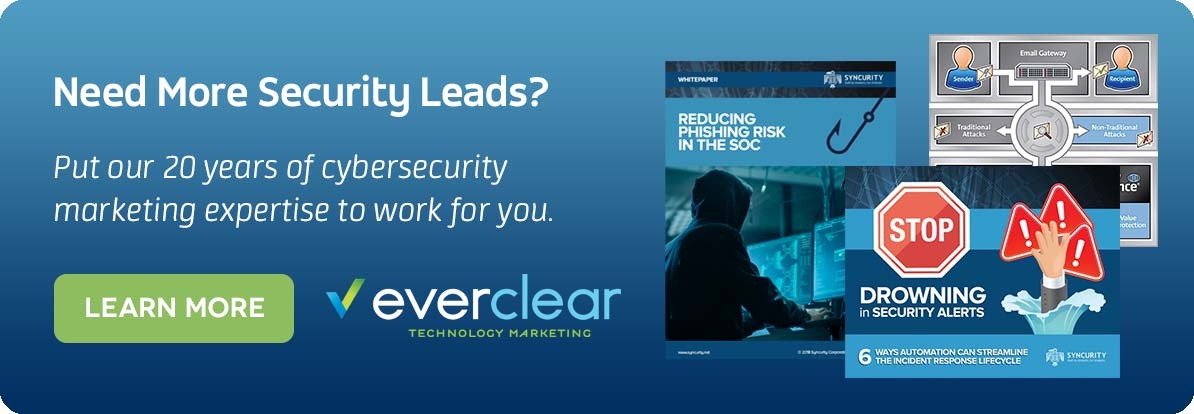
From working with more than a dozen cybersecurity software companies over the past 20 years, I've seen firsthand the challenges of marketing in this space. When it comes to security, you need to stand out, but at the same time you can't be too bold.
Finding this balance and communicating to the different roles in the IT organization — from operations to security, admins to managers to executives — is what can take your organization from a struggling company with an innovative solution to a successful company with a highly differentiated solution.
Here are the Top 5 Cybersecurity Marketing Challenges and some tips to address them:
1. Stand Out from the Pack, But Be Credible
Security pros know that nothing is 100% secure ... so you better not make outlandish claims, because you will lose all credibility ... and in the security industry especially, this is huge. Hackers love to be challenged, so making claims that your software can't be beat puts a target on your back and you're asking to be embarrassed.
Your company and product positioning has to be strong enough to stand out, but it's got to hold up. Too many vendors use F.U.D. (Fear, Uncertainty and Doubt) and all the latest buzzwords, such as APT's, cloud, DDoS, etc., to draw customer attention, but what ends up happening is that if you walk the exhibit hall of RSA, Black Hat or an information security event many of these vendors look and sound the same.
Don't be afraid to get specific with what you do and show value to a business beyond "better security" ... which leads us to the next challenge and tip.
2. You Can't Be Everything to Everyone
The biggest mistake is trying to be everything to everyone. Seems simple enough, but I've seen too many companies make this mistake.
I once heard a client say, "we can sell to everyone." Big no, no.
Understanding your buyer is important for any industry, but in the information security space (which is overcrowded and where messaging is so diluted that many vendors look the same), this cannot be overstated.
Make sure you clearly carve out your security sector(s), i.e., endpoint, network, cloud, data protection, data center, etc.) and understand what roles are the main buyers, influencers, etc. Are there regulations, or industry standards that are pertinent?
All of these attributes can help you position the features, benefits and differentiators of your solution to the right people in the right organizations.
3. Nothing Sells Better than Hearing from a Customer
A customer program needs to be part of your sales and marketing process. Customer case studies are the best way to sell a solution — what's better than a company saying how they use your product, the results, etc.
The challenge (and reality) is that very few companies are willing to go on record. There are a few ways to navigate the challenge of customer references. When negotiating contract pricing, as part of obtaining a better price, have the customer agree to provide a public reference (and have this signed by someone in management).
The optimal approach for both you and your customer is to do a video testimonial or a written case study, so you can edit it and have it in a controlled environment. This gives you something that doesn't have a shelf life and it gives the customer some control (as opposed to conducting an interview with a reporter, etc.). This way, you and the customer can agree ahead of time on the specific questions and how they would be answered.
4. Content is King (If you do it Right)
In the marketing world, there is the saying, "content is king.” This is true, but it's not about having lots of content ... it's about having content that is highly relevant and educational to your buyer as they begin researching, evaluating and purchasing cybersecurity solutions.
This is more of a general tip, but in the cybersecurity space people want to learn best practices and get hands-on guidance, such as "How to deploy XYZ in your network" or "5 Tips to secure your data."
This is content that provides explicit steps and recommendations that can be useful. Providing content that is more consultative can open the door to customers asking questions and evaluating your product.
Technical content can be very effective if a subject matter expert is available to interview internally at your company to generate educational (not promotional) content. For example, discussing the specific ins-and-outs of how to guard against or detect, respond and remediate phishing attempts, ransomware or other attack vectors.
5. Don't Forget to Influence the Influencers
Start following security professionals on social media platforms, such as LinkedIn and Twitter to understand what security keywords, topics and trends CISOs, CIOs, Security Directors, SOC Managers and Security Analysts are talking about.
Start broad and then narrow it down more specifically to your area of concern. Not only will this plug you into current events you can latch onto (the latest threat, data breach, update to PCI-DSS, etc.), but you can also identify influencers in the security community.
Short of getting a customer to go on the record, there are many security influencers (analysts, practitioners, bloggers, etc.) who you can engage with to help spread the word about your particular security solution.
There are plenty of other cybersecurity marketing challenges that companies need to address, including foundational issues that many cybersecurity companies overlook, such as positioning, messaging and differentiation.
Without eventually taking the time to communicate how your specific security software, hardware or services are not only different than the competition, but the benefits of those solutions resonate with security buyers, then your cybersecurity marketing efforts won't be as effective as they need to be to generate more leads, drive more pipeline opportunities and earn more revenue.
Looking for a Marketing Agency with Cybersecurity Experience?
If your organization needs help marketing its cybersecurity software, hardware or services, Everclear has more than 20 years of Cybersecurity Marketing expertise.



